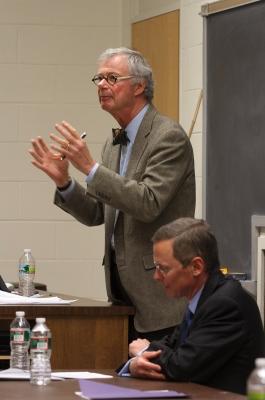'What's Your Major?'
President William G. Durden ’71 and Jeffrey Figurelli ’83 extol the virtues of a liberal-arts education

Pres. William G. Durden '71 and Jeffrey Figurelli '83
By Tony Moore
The question students hear more than any other—from the moment they graduate from high school until they graduate from college—is, "What's your major?" It's universally asked, by parents, classmates and anyone else met along the way. It's an icebreaker, a social probe and, most important, a direct and lucid window into the personality, potential and future of the person answering.
At least that's what people think. But not so, says Jeffrey Figurelli '83, a former English major who recently held the position of global chief operating officer of the Financial Institutions Group at BlackRock: "One's major is more an expression of personal taste than it is a foreshadowing of destiny. How you major is far more likely in the long run to be more important than what you majored in."
Major Debate
On Monday night, Dana 110 was filled nearly to capacity for what was dubbed Major Debate, an event hosted by the Office of Academic Advising aimed at uncovering the true importance and implications of choosing the "right" major and the value of a liberal-arts education, regardless of the major chosen. President William G. Durden '71 and Figurelli spoke with the audience, comprising chiefly first-year and sophomore students and a hand-picked group of upperclassmen, for nearly an hour.
Also on hand were Damon Yarnell, associate dean of academic advising; Phil Jones, dean of career development and assistant vice president for student development; and faculty representing each of the three college divisions. Together, the panel emphasized the flexibility of a liberal-arts education and the importance of a mindful, energetic approach to the Dickinson experience as a whole.
"I want to talk about the value of a Dickinson education, but I don't want to give you clichés," Durden began. Cataloguing his own evolution—from potential English major to German and philosophy double major to the Army and off into corporate and academic life beyond—Durden certainly didn't offer up any clichés. Instead, he painted a vast and varied picture of a professional life uniquely colored by the liberal-arts underpinning he got at Dickinson.
"What I learned here is the ability to associate elements of knowledge that most people won't even look at, won't even see," he said. "When you connect, say, law to biology, when you connect psychology to literature, when you make these connections, you make new space ... This is extremely critical."
Durden made clear that, as a liberal-arts education prepares the student for all paths, graduates should absorb and experience life instead of trying to dictate its path.
"Let it happen to you. You will be prepared," he said, reaching the end of his lesson. "Take something from it, and maximize it."
Leading a rich life
Figurelli, who peppered his remarks with references to classical literature and Latin phrases, stressed the flexibility of a Dickinson education.
"I believe the liberal-arts education is almost infinitely flexible and practical, if only it be applied deliberately," he began. "And I hope that by sharing a glimpse into how I've applied my Dickinson education, I might encourage and inspire you not only in choosing a major but also to start to think of all the possibilities you have in your lives."
Figurelli took his own broad-based undergraduate education and made it the foundation for much more than a staggeringly successful career. "My experience here shaped my life and career," he told the audience, "and I say life and career because it's both: it's not really just about career per se; it's also about leading a rich life, and the experience here is vital to that."
Like Durden, Figurelli stressed that one's major is not the deciding factor in future success or happiness. His final advice was to focus on making the most of your major rather than worrying about whether you've chosen the "right" one.
"Major in what you're passionate about, what challenges you and what engages you," he said. "Pursue whatever that is with all your power, and if you learn the liberal-arts way, the Dickinson way, you'll be preparing for a rich life, not just a good career."
The Benefits of Learning the "Dickinson Way," According to Figurelli:
- thinking in analogy and metaphor, leveraging what one knows through synthesis, finding or forging links between anything that at first might seem to have very little in common.
- determining what is true and what ought to be valued
- remaining tenacious: i.e., staying in the game long term
- communicating effectively
Published October 24, 2012